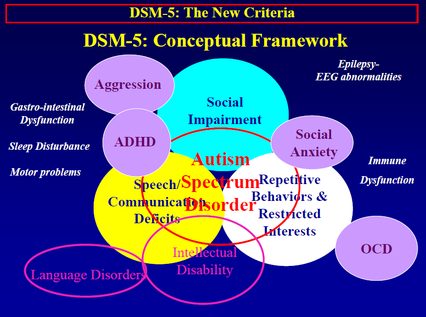House rules for children
Family Rules | Creating Structure | Essentials | Parenting Information
Family rules help create structure. A family rule is a specific, clear statement about behaviors you expect from your child. Rules work best when there is consistency, predictability, and follow-through.
Why are family rules important?
Family rules help children understand what behaviors are okay and not okay. As children grow, they will be in places where they have to follow rules. Following rules at home can help children learn to follow rules in other places. It is normal for children to break rules and test limits. Consistent follow through with consequences when rules are broken help your child have a clear understanding about the importance of rules. Remember, young kids sometimes break rules because they simply forget. Not all broken rules occur because kids are testing the limits. But, our responses should be the same no matter what the reason for breaking the rule.
Why should all family members know and follow the rules?
For family rules to work well, everyone needs to know, understand, and follow the rules. By doing this, children don’t get mixed messages about what is okay or not okay. For example, you know screen time should be limited for young children and you want dinner time to be family time so you set a family rule that no screens are allowed during dinner time. If another caregiver checks their phone during dinner, your child may be confused. Your child’s behavior will be better if all caregivers support the rules in the same way. This is true for parents, grandparents, or any other caregivers in your child’s life.
How can all family members get on the same page about rules?
There are several steps that can help all family members be consistent. Parents or caregivers can:
- talk about what rules would help their family and agree which ones to set
- post the rules in the house so everyone can know them
- talk with other adults who care for their children about the rules to make sure everyone knows what is allowed and not allowed
- ask all caregivers to be consistent in monitoring and enforcing the rules
- remind children about the rules by repeating and posting them in the home
What is a good number of family rules for toddlers and preschoolers?
The number of rules you set depends on your child’s ability to understand and remember.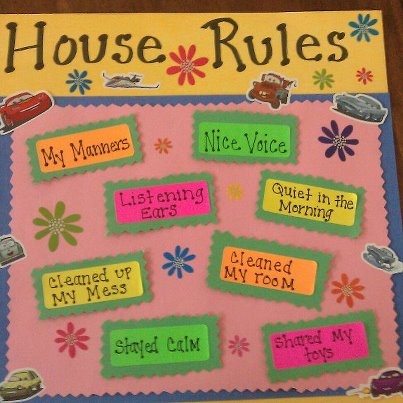 It is also hard for parents to consistently enforce lots of new rules. For young children, focus on only two or three of the most important rules at any one time. As your child learns a rule and is following it consistently, you can add new rules.
It is also hard for parents to consistently enforce lots of new rules. For young children, focus on only two or three of the most important rules at any one time. As your child learns a rule and is following it consistently, you can add new rules.
Steps for Creating Family Rules
Family rules help create structure because children know what behaviors are okay and which ones are not okay. The steps for creating family rules are below
Identify and clearly define the rules. Toddlers and preschoolers can only learn and remember two to three rules at any one time. Try starting with one rule to give children a chance to learn how family rules work before others are added. Family rules should also be realistic and fit your child’s age. The rule should be something that your toddler and preschooler can obey.
Avoid vague rules, such as “be good.” “Be good” includes many different things and could be hard for a child to understand. A more specific rule would be “Talk to other how you would like them to talk to you.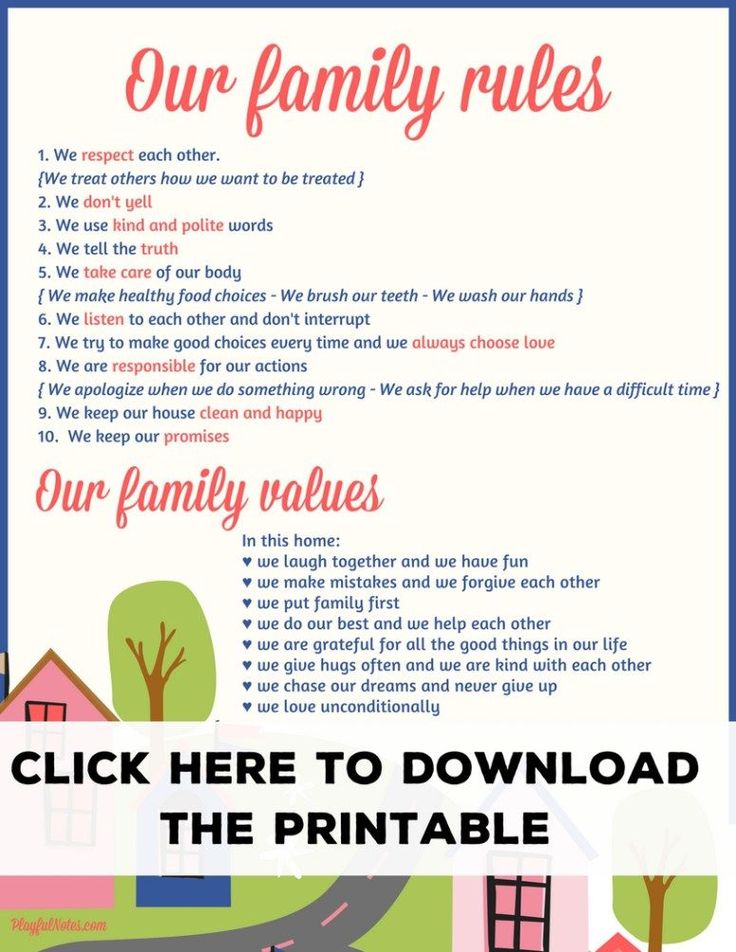 ” Unacceptable behaviors should be stated as a clear and concrete rule, such as “No hurting others.” It is also important to state the acceptable or desired behavior immediately after the rule so your child knows what behavior you expect. For example, if you have told your child, “No hurting others,” you can follow that up with “You need to keep your hands and feet to yourself.”
” Unacceptable behaviors should be stated as a clear and concrete rule, such as “No hurting others.” It is also important to state the acceptable or desired behavior immediately after the rule so your child knows what behavior you expect. For example, if you have told your child, “No hurting others,” you can follow that up with “You need to keep your hands and feet to yourself.”
Examples of common family rules:
- No hurting. Keep your hands and feet to yourself.
- No interrupting. Wait for your turn to speak.
- No yelling in the house. Use an inside voice when talking in the house.
- No climbing or jumping on furniture. Sit on the couch or lie down on the bed.
Make sure your child knows and understands the rules. Check your child’s understanding by having her repeat the rule in her own words. For toddlers and preschoolers, you may need to help them understand what some words in the rule mean. For example, if the rule is “no hurting others,” you may need to describe what “hurting” means.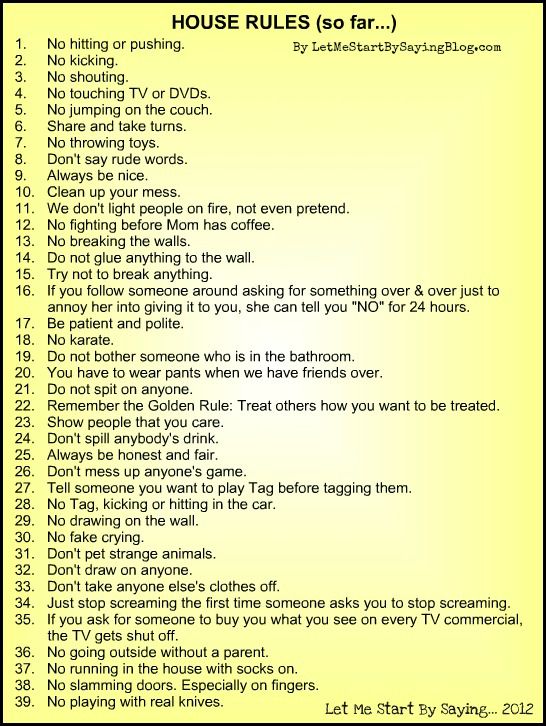 When a child first hits, bites, or kicks someone, you may need to say, “Hitting is hurting. Our rule is no hurting. You should keep your hands to yourself.”
When a child first hits, bites, or kicks someone, you may need to say, “Hitting is hurting. Our rule is no hurting. You should keep your hands to yourself.”
Toddlers and preschoolers need frequent reminders about the rules. Rules can be repeated often and you can place reminders, such as rules charts, in places where everyone can see them. Good locations to place rule charts include the refrigerator door or on another door that everyone uses.
The family rules chart should contain at least two columns: the rules and the consequences for breaking the rules. Pictures or visual cues can be used on charts for toddlers and preschoolers because they cannot read. Click here to create a family rules chart.
All family members should follow the family rules, given they are “family” rules. Young children look to their parents to learn how to behave. For example, if you are respectful and listen to other adults, you can teach your child to listen to adults.
When you see your child following the rules, you can let her know you see her making good choices by providing a labeled praise.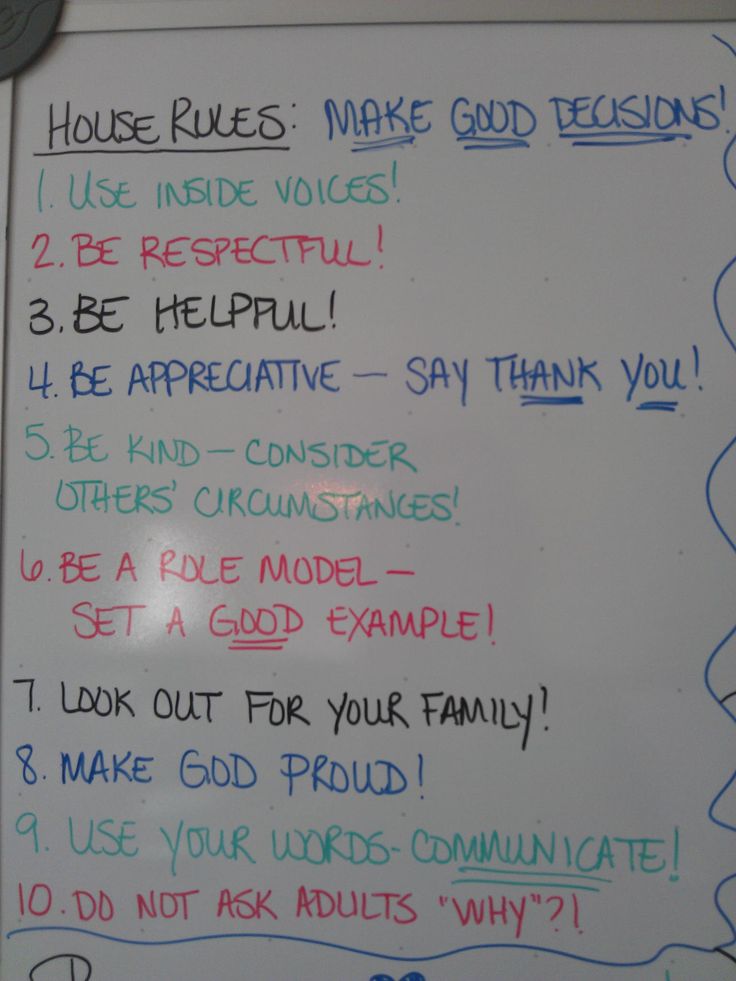 Labeled praise lets your child know exactly what she has done that you liked. The praise should occur as soon as you notice your child’s behavior. Praise should be used a lot when you create a new rule to help your child get used to this new expected behavior.
Labeled praise lets your child know exactly what she has done that you liked. The praise should occur as soon as you notice your child’s behavior. Praise should be used a lot when you create a new rule to help your child get used to this new expected behavior.
When family rules are always enforced, your child’s behavior and your relationship will be better. Family rules should receive an immediate response when broken. Consequences for breaking family rules should be clear to the parent and child. They are included on the rules chart as a reminder of what to expect. Consequences for broken family rules should be enforced immediately.
Top of Page
26 House Rules For Kids To Help Them Grow Responsible
Practical tips for establishing child-friendly boundaries and maintaining a peaceful environment at home.
Image: Shutterstock
House rules for kids are helpful to create a stress-free atmosphere at home. They help provide a basic structure about how the family functions, creating an environment for disciplined upbringing.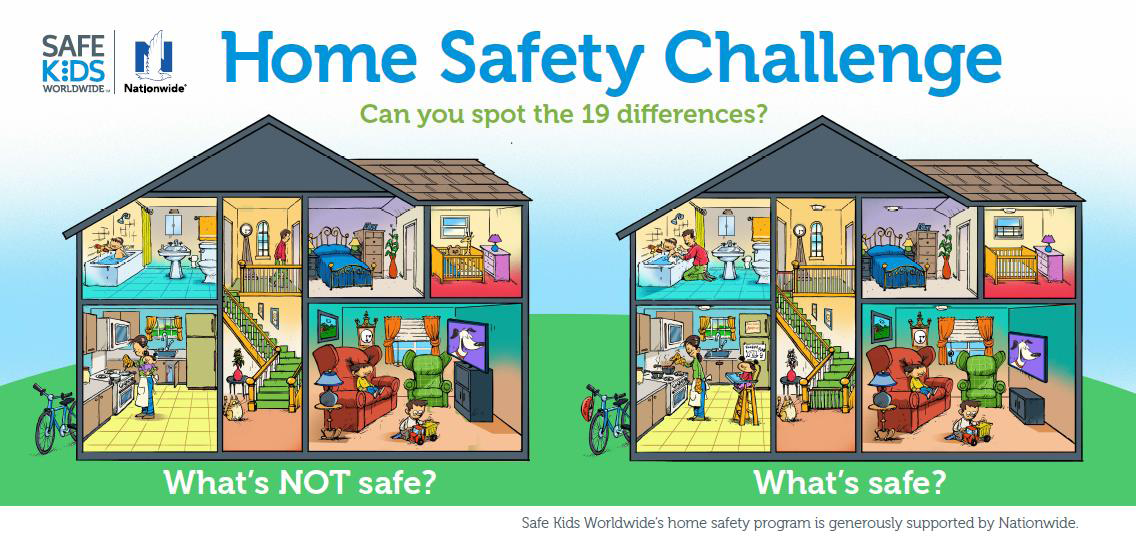 House rules clearly state your expectations, and following them makes everyone’s life easier in the family. Children also tend to feel safer in a home where household rules are implemented and followed.
House rules clearly state your expectations, and following them makes everyone’s life easier in the family. Children also tend to feel safer in a home where household rules are implemented and followed.
House rules do not have to be complicated, and you need not always enforce them strictly. However, following these rules as frequently as possible can help children know what to expect from their surroundings and grow up as disciplined individuals.
This post brings some applicable house rules that you may use for your children. We also provide you with tips about ensuring that the children agree to and follow the rules.
Tips For Creating House Rules For Kids
Creating rules is the easy part. But how do you ensure that your children follow them? Here are some tips for creating house rules for kids.
1. Ask them for their input
Rules are created to ensure your children’s safety, and some of them are non-negotiable. Not opening the door without checking who is outside, not crossing the road without checking both sides, not touching hot or sharp objects, etc.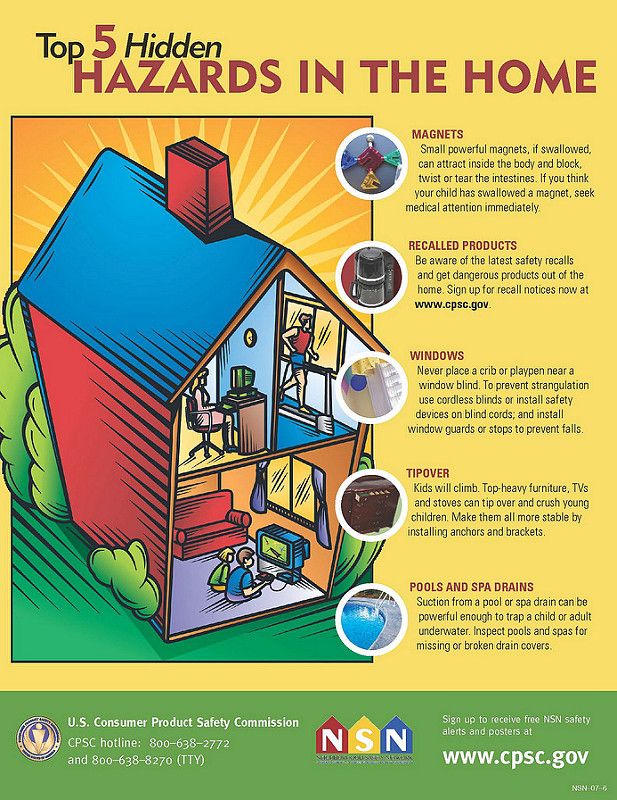 , are some rules that are mainly set for their safety and should always be enforced.
, are some rules that are mainly set for their safety and should always be enforced.
However, make sure you ask their opinion before you enforce the rules on them. Asking them, “What do you think?” goes a long way in boosting their confidence and making them feel included.
Related: 10 General Safety Rules You Should Teach Your Children
2. Take everyone’s schedules into account
Before you make any rules for the family, you must ensure you take everyone’s schedules and needs into account.
How big is your family? How old are the children? Do you have pets? Do any of the family members have any allergies or medical conditions that everyone needs to remember? Ensure you make rules that accommodate all of these conditions.
3. Consider their age and maturity level
When you introduce rules to your children, you must take their age and maturity level into account. Experts believe that you can introduce rules to your children once they are school-aged.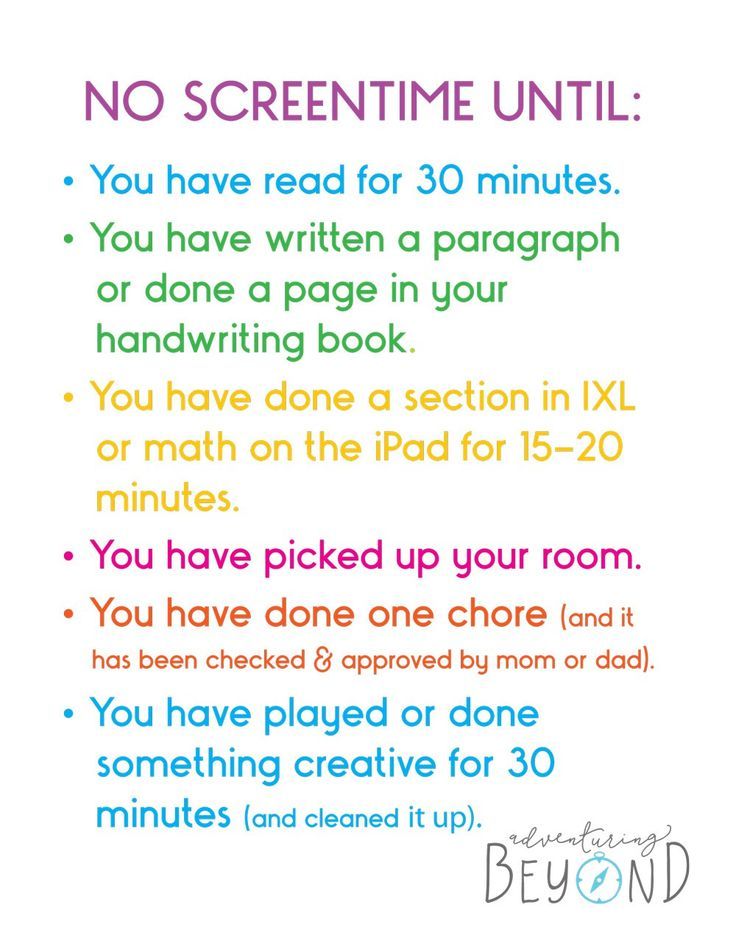
Children who are too young (infants and toddlers) will not understand your instructions well, and you will have to step in often. Older children, on the other hand, like taking control of things. Ask them specific questions about a rule so that they understand. You can also give them choices to let them feel a sense of control. For example, put two shirts in front of them, and let them choose one to wear.
4. Set consequences when rules are broken
Children are bound to break the rules occasionally. Thus, you must ensure they know the consequences when they break one. Be consistent with implementing the decided consequence because if you let it go a few times, they will learn that they can break the rules and get away with them.
In some cases, you can ask them to make the rules themselves to remember them better. Further, remind them of the rule and the consequences occasionally. For example, if they have the habit of throwing toys on the floor, ask them what would happen if they broke a new toy.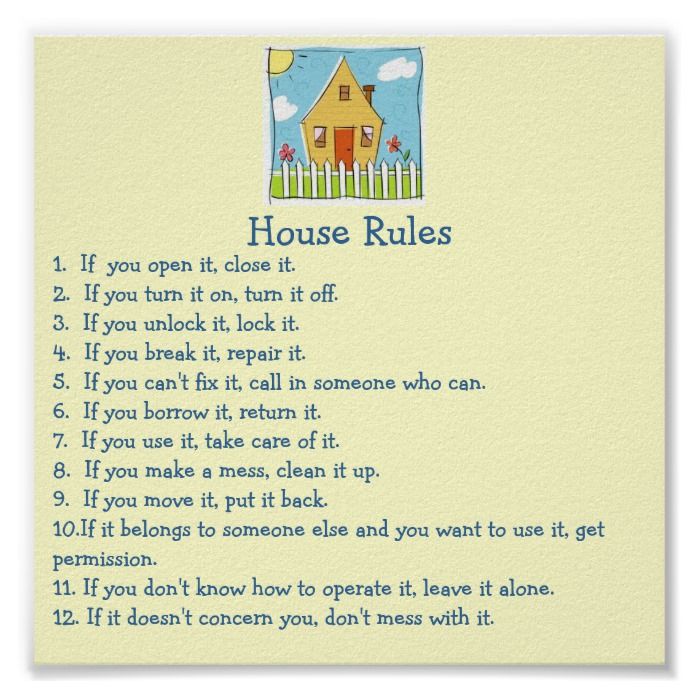 They will most probably answer, “No new toys for a while.”
They will most probably answer, “No new toys for a while.”
5. Help your children follow the rules
Track your child’s progress and make visual aids for them to understand and remember the rules. Praise them when they follow the rules, just as you enforce the consequences when they break them.
Make sure you never shout at or shame them in anger. If rules are not being followed, discuss with them only after you have overcome your anger. In some cases, removing a child from a potential rule-breaking situation might help.
Related: 6 Family Rules Essential For A Disciplined And Harmonious Life
6. Follow the rules yourself
Children learn by watching you. If you do not practice a rule, do not expect them to follow it either.
If you do not follow a rule for any reason, explain it to your children in clear terms. For example, if you have an early bedtime rule for the children, but you stay awake, explain why you do so.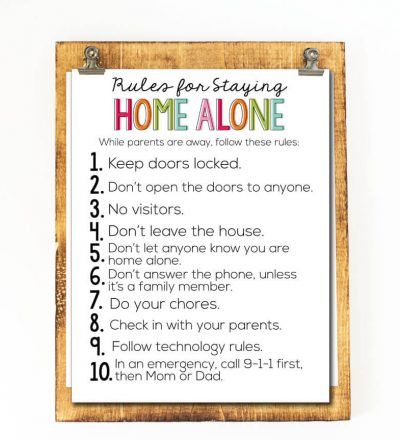 This will help them understand the difference and follow the rules you do not or cannot follow.
This will help them understand the difference and follow the rules you do not or cannot follow.
Quick tip
Give a clear reason for every rule that is set. This helps your children understand that rules are for their safety and not to restrain or control them.
26 House Rules For Children
Humans are social creatures and require structure to perform efficiently. These basic house rules will ensure that your house runs smoothly and has less yelling and tantrums overall. A home with rules is an efficient home.
1. Knock before entering
This is a basic but important rule. It is helpful for children to understand the importance of personal space and privacy. As your children grow, they will require privacy themselves. Thus, the sooner your children learn it, the better.
2. Respect everyone in the household
It doesn’t matter if a family member is older or younger; respecting every family member is a non-negotiable rule. Name-calling, answering back, walking away rudely, slamming doors, and throwing objects in anger are disrespectful behavior and should be discouraged.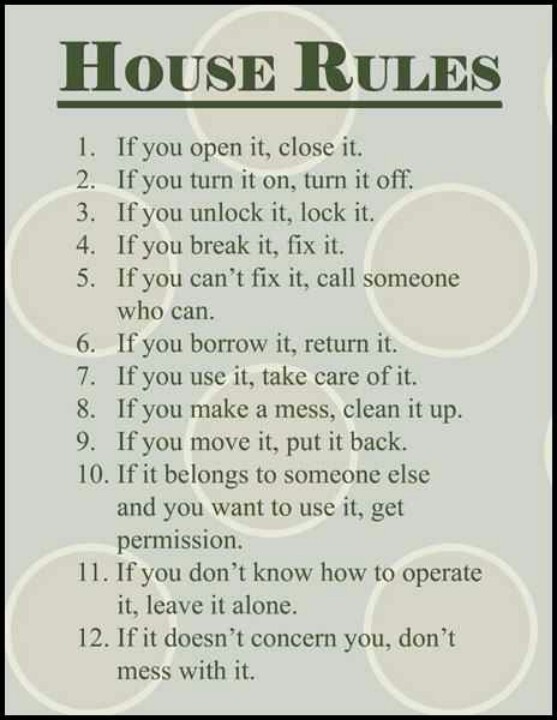
3. Do not exceed your screen time
It is tempting for you to give your children an iPad or switch on the television so that you can get some work done or when you are too tired to engage with the children meaningfully. While extended screen time is okay once in a while, regular extended screen time might cause more harm than good for your child. Fix a set screen time and follow it yourself too.
Point to consider
Showing videos by qualified professionals explaining the hazards of overexposure to digital screens to your child is an effective way to help them realize the gravity of the problem.
4. Keep your promises
Promises must be kept at all costs. Children have the habit of making rash promises to get out of an awkward situation. They do not do this intentionally, but they are not forward-thinkers as grown-ups. It is up to you to ensure that your children keep their promises.
5. Don’t say anything if you cannot say anything good
This is an important rule, especially in today’s world of social media.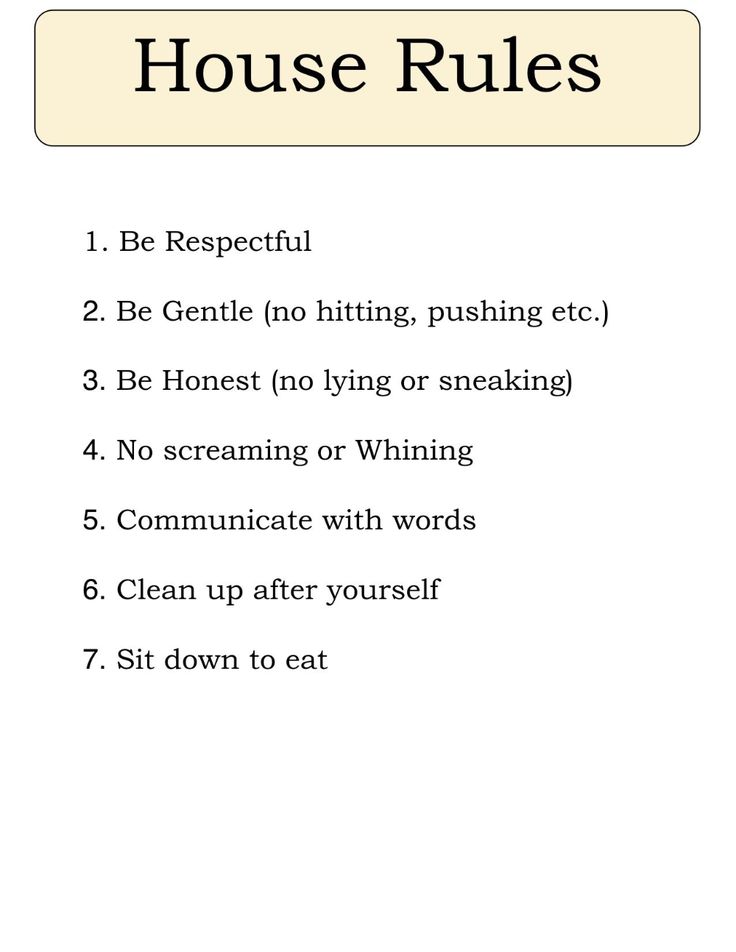 People, especially trolls, have the nasty habit of writing rude comments and sending offensive messages under the cloak of anonymity. Children must be made to understand from a young age that if they cannot say anything good, it is best not to say anything at all.
People, especially trolls, have the nasty habit of writing rude comments and sending offensive messages under the cloak of anonymity. Children must be made to understand from a young age that if they cannot say anything good, it is best not to say anything at all.
6. Pick up after yourself
This rule will not only help your child but also make your life easier. If your children have the habit of asking you for everything and leaving things as they are behind them, set this rule. If they have had a glass of water, they must put it on the counter or in the sink. If they have played with toys, they must put them away before moving on to other things. While you may help them clear up, the sooner you teach your child to pick up after him or herself, the better.
7. Tell the truth
Every child lies at some point in their life. Usually, children in the age group of four to six years have the habit of coming up with stories, and adolescents lie for some self-serving purpose, usually to get out of trouble.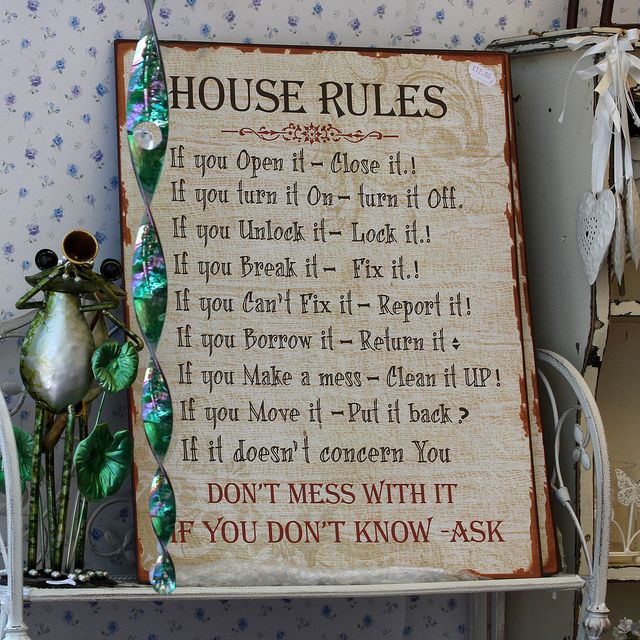 While a few white lies are acceptable, the parents must ensure that the children aren’t lying to hide something significant. Children often lie if they fear the parents’ reactions, so take this potential reality into consideration.
While a few white lies are acceptable, the parents must ensure that the children aren’t lying to hide something significant. Children often lie if they fear the parents’ reactions, so take this potential reality into consideration.
Related: 17 Signs That You Are A Strict Parent
8. Respond when someone talks to you
Children are often so lost in their world of music or videos that they do not realize someone is calling them or speaking to them. Sometimes, teens or tweens might not respond because they are angry and sulking or because they do not like the person talking with them.
This rule ensures that children respond every time someone talks to them. Sitting mum when someone asks them something is rude. If they do not want to interact with someone or aren’t comfortable, they should excuse themselves and leave the room.
9. Inform the family about a new project well in advance
Although this is more applicable to school-going children who have an uncanny habit of springing a surprise on you the night before they have to submit a science assignment at school, it could apply to tweens and older children too.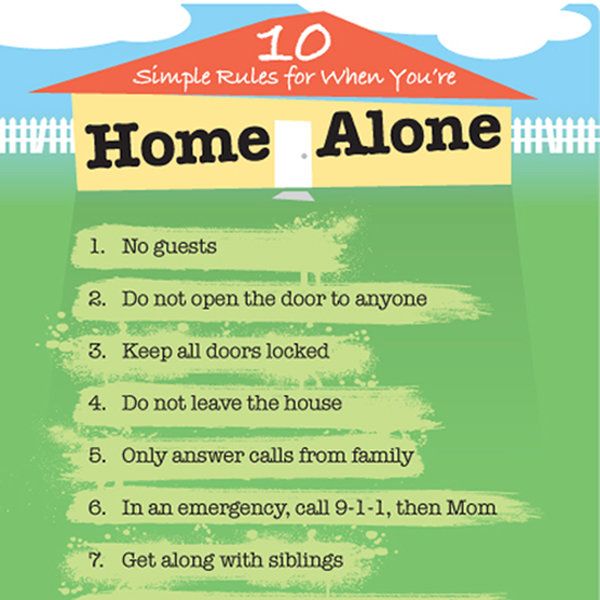 If they have something on their calendar, they should inform the family well in advance and not request you at the last minute.
If they have something on their calendar, they should inform the family well in advance and not request you at the last minute.
10. If your plans change, inform the parents
Children often make plans on the spot depending on their moods. However, if they have a change in plans, it is their duty to inform you. Whether they plan to walk outside during their sleepover, go to a friend’s house after school, or watch a movie on their night out, they should inform you if the plan is newly made.
11. Say the magic words
As parents, we usually do not expect our children to say “please” or “thank you” after everything we do for them. However, teaching them the power of these magic words is crucial. Not only do the parents get a positive affirmation from these words, but the children learn that they have to use these in the real world to make a good impression.
12. Wait for your turn to speak
The sooner you teach your children to wait their turn before speaking, the better it is for you and them.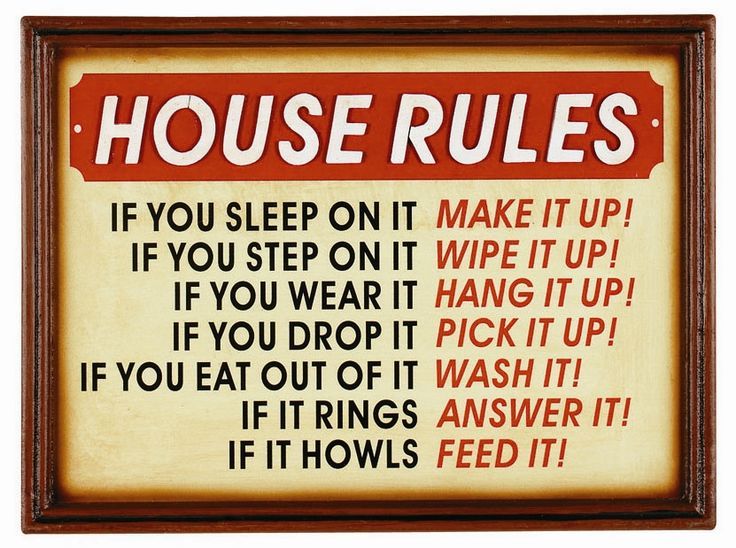 Children always have something to say, and they will most likely want to tell it the moment the thought pops up in their head. However, if you are already talking to someone, the child has to learn to wait until you and the other person have stopped talking before they can say something.
Children always have something to say, and they will most likely want to tell it the moment the thought pops up in their head. However, if you are already talking to someone, the child has to learn to wait until you and the other person have stopped talking before they can say something.
When you have finished talking to the other person, make sure you ask your child what they want to say and listen to them carefully. This validates their feelings.
13. Know that with privilege comes responsibility
If you do not want your child to grow into an entitled adult who seizes everything they want without caring for others feelings, you must teach them the value of privileges. Emphasize the importance of fulfilling responsibilities to earn privileges. When children learn that privileges are earned and not served on a platter, they will remain grateful for their privileges and not misuse them.
14. Maintain proper hygiene
This might seem to be a no-brainer, but expecting your children to maintain basic dental and body hygiene is vital.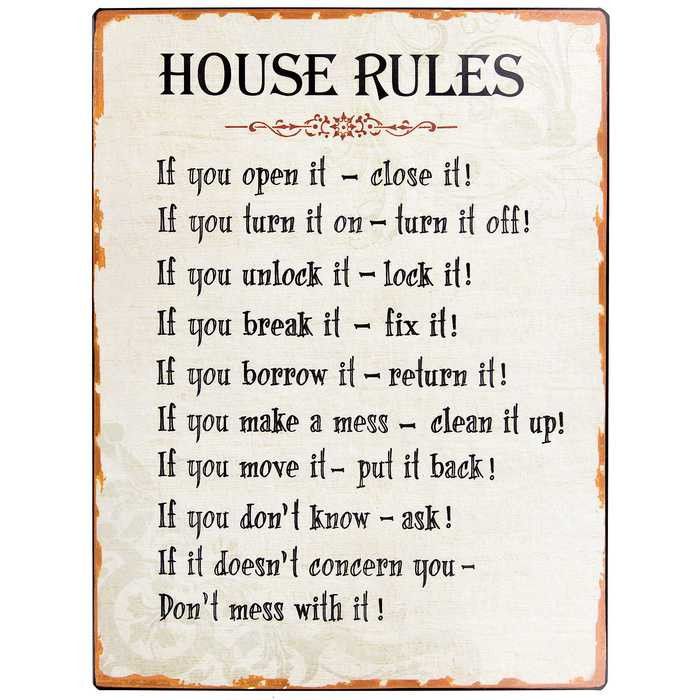 When life becomes hectic, the first things to be sacrificed are bathing and brushing. This rule will ensure that they follow hygiene practices no matter how tough life is and stay healthy.
When life becomes hectic, the first things to be sacrificed are bathing and brushing. This rule will ensure that they follow hygiene practices no matter how tough life is and stay healthy.
15. Borrow only after asking
Even if something belongs to the parents or siblings, children need to know that they can borrow something only if they ask the owner’s permission. If you skip this rule at home, your children will not realize that they cannot borrow other people’s possessions without permission, and they might start taking what they want without asking. This will most likely earn them a bad name.
16. Do not take your parents efforts for granted
If children are not made to understand the difficulties their parents face to provide them a good lifestyle, they might start taking things for granted both inside and outside the home. They might make demands without realizing how much you have to go out of your way to accommodate their requests. Let your children know the effort and hard work you put in so that they never take you for granted.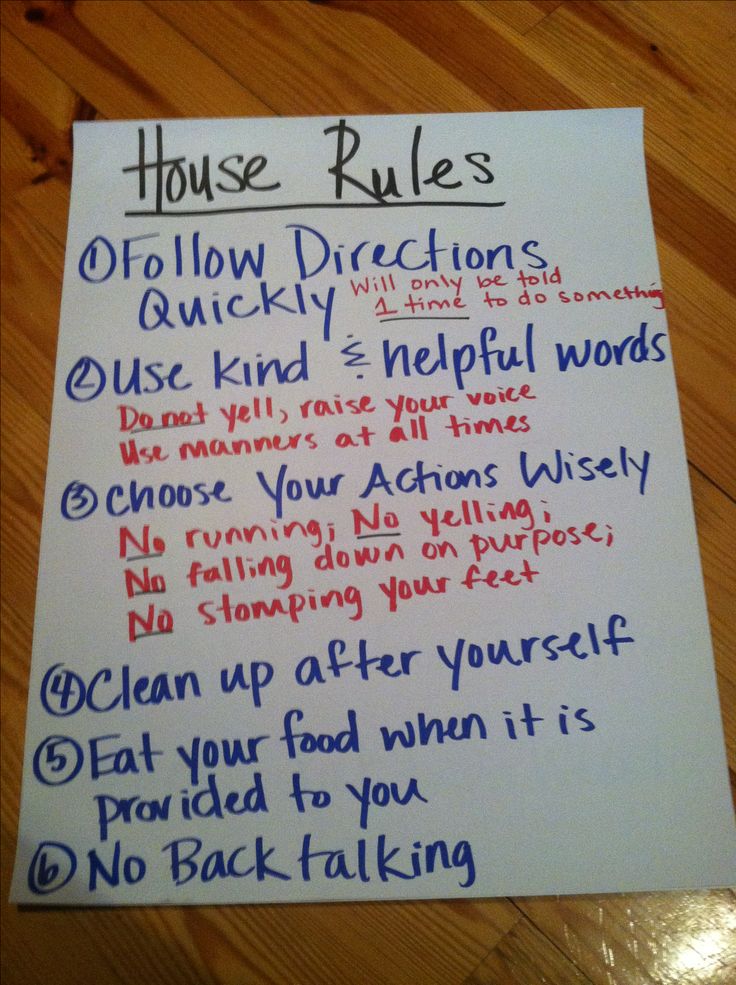
17. Return borrowed items to the owner in the same condition
If your children have borrowed something from others, it is their responsibility to take care of the item and return it to the owner in the same condition they borrowed it and within the allotted time frame. This rule ensures that your children are mindful of others’ belongings. This also teaches children that they can earn other people’s trust by handling their property with care and returning them well before or on the date expected.
18. If you make a mess, clean it up
Children are known to create messes. However, they must learn that if they create a mess, they should clear it up. If they cannot clean by themselves, they should ask an adult to assist them. This is not only important for them to learn about the importance of cleanliness and take responsibility but also reduces the chances of unintentional hazards, such as slipping on the floor they have spilled water on.
19. Attend family gatherings
Most family gatherings are happy events that involve food, drinks, games, and lots of laughter. They are an excellent way for children to socialize. If you do not have any family nearby, you can arrange for a gathering of friends. If none of your friends are free to drop in, you can arrange for your family to have game nights, movie nights, or debate nights. Every family member can choose an activity according to their preference, and everybody in the family must participate. If this is difficult, it may be beneficial to join a parents’ group and organize group playdates.
Do remember
The company of adults may overwhelm an introverted child. In such a case, keep your regular gathering limited to a few members of your family and friends.
Related: 55 Fun Indoor And Outdoor Games For Family Reunion
20. Think before you speak
Thinking before speaking is an important habit that will hold your children in good stead all through their lives. Teach them the value of words and the effect they cause on other people’s feelings. This rule will make them understand how important their words are, and they will learn to use them wisely.
21. Apologize and make amends when someone is hurt
Saying sorry and getting out of the scene is easy for children. Often, they do not understand the implications of their actions and the effect they have on others. Thus, they may say sorry and forget about the situation. However, they must be made to understand the result of their actions, and they should not only apologize but also make amends to the person they hurt.
22. If you take something from somewhere, return it to the same place
How many times do you find things taken from the kitchen and left in the living room? Once they are done with an item, most children simply leave them there and move on to the next thing that catches their interest. This can be highly frustrating to the others in the family when they cannot find the item. This rule will make sure children place things in the right places.
23. If you take the last of something, tell at least one parent
Whether it is the last cookie from the jar or the last pencil from the stationery set, children need to tell you that it was the last thing to you so that you can put it on your shopping list. Failing to do so might cause endless problems, the worst of which involves discovering an empty packet on a hectic day.
24. Keep an open mind
The world is diverse, and every day, your child has the chance to meet people who do not conform to their understanding of the world. This rule teaches them to have an open mind and accept people who are different from them. These differences might be physical, mental, spiritual, religious, sexual, or any other. This rule will enable your children to embrace other cultures and encourage them to mingle with new people even in the future.
Related: What Are Kids Scared Of And How To Help Them Manage Fears?
25. Never bully others
Everyone hates a bully. They take pleasure in other people’s sufferings. It is necessary that you encourage them not to be one. Also, encourage them to stand up against bullying and inform the authorities whenever they witness one.
26. Be empathetic
There are not enough empathetic people in the world. Being empathetic means understanding the struggles of another person and lending them an ear. You may not be able to help them. But you can at least listen to their troubles and try to alleviate them. Raising empathetic children is the need of the hour.
House rules for kids are important because they ensure an organized lifestyle and help develop disciplined individuals. Setting house rules will enable you to slowly prepare your children for the challenges of the outside world. However, before choosing the house rules, consider your children’s opinions, keep their age and maturity level in mind, and be a good role model by following the rules yourself. Some simple house rules that you may set are knocking before entering a room, not exceeding their screen time, or waiting for their turn to speak. Though children may miss out on following the rules some days, you need not worry about it. Instead, ensure that they follow the rules on most days. Gradually, these rules will help them develop good habits and make them well-balanced individuals.
Key Pointers
- Respecting all family members, irrespective of their age, should be non-negotiable in any family.
- Be polite and use words, such as “please” and “thank you,” every time someone says or does something nice for them.
- If you make a mess, clean it up; children can learn to clear any mess they create the next time.
References:
MomJunction's articles are written after analyzing the research works of expert authors and institutions. Our references consist of resources established by authorities in their respective fields. You can learn more about the authenticity of the information we present in our editorial policy.
- Essentials for Parenting Toddlers and Preschoolers.
https://www.cdc.gov/parents/essentials/structure/rules.html - How to Teach Good Behavior: Tips for Parents.
https://www.aafp.org/afp/2002/1015/p1463.html - Screen Time and Children.
https://www.aacap.org/AACAP/Families_and_Youth/Facts_for_Families/FFF-Guide/Children-And-Watching-TV-054.aspx
- Lying and Children.
https://www.aacap.org/AACAP/Families_and_Youth/Facts_for_Families/FFF-Guide/Children-And-Lying-044.aspx
The following two tabs change content below.
- Reviewer
- Author
Memo for parents of preschoolers and schoolchildren "RULES OF SAFE BEHAVIOR FOR CHILDREN"
Municipal budgetary educational institution "Novosheshminskaya primary school-kindergarten" Novosheshminsky municipal district of the Republic of Tatarstan
| Parent's note preschoolers and schoolchildren "GUIDES FOR SAFE BEHAVIOR FOR CHILDREN" |
|
DEAR PARENTS!
From preschool age, children should be taught the correct behavior in an emergency. We offer you a leaflet , which reflects the basic rules of safe behavior for children. THE CHILD MUST REMEMBER THE FOLLOWING RULES: 1. Do not go outside without adults. 2. Do not play on the sidewalk near the roadway 3. Cross the street only at the pedestrian crossing at the green traffic light. 4. Be attentive, but not overly cautious or cowardly. 5. Know well all the landmarks in the area of \u200b\u200byour house 6. Walk in the middle of the sidewalk, avoiding bushes and doors. Especially abandoned houses.
The time is not far off when your child will go to school and stay at home alone, get from home on his own before school. Therefore, you, the parents, already today need to teach the child elementary safety rules in order to raise a child who is cautious, but self-confident, able to make decisions. HOME ALONE: 1. The child must know the phones by which he can instantly ask for help. 2. The child must close the door to the latch (this will increase the responsibility of the child, save him in case of emergency). 3. You need to write for the child a list of those people, which he can release. These people fall in the "acquaintances" category. The rest are “strangers”, including neighbors if they are not on the list.
4. The child should never speak, that he is home alone.
ONE OUTSIDE: 1. Stay close to friends and people all the time. 2. 3. Do not talk to strangers and do not take anything from them. 4. Do not get into their car. 5. Do not enter the elevator with strangers. 6. Do not be afraid to attract attention to yourself if a stranger grabs your hand, picks you up, drags you into the car, pushes you into the entrance. It is necessary to shout loudly: “Help, help, stranger!”
1. Children are strictly prohibited from using matches. Gas stove, stove. Electrical sockets, included electrical appliances. 2. Children of older preschool age need to be taught how to properly handle scissors, a knife, a needle. 3. Adults should keep the following items out of the reach of children: household chemicals, medicines, spirits, cigarettes, food acids, cutting and piercing tools. 4. Children should not be left alone in a room with an open window, balcony, go out onto the balcony without an adult, or go to an open window. 5. You need to be able to use the phone in case of fire (call the fire department at number 01). In case of injury (call an ambulance at number 03). 6. You need to know your address. Phone numbers of adults you know who live nearby. 7. You need to be able to attract the attention of passers-by and call for help in case of fire, criminals entering the house. 8. You need to be able to put out a starting fire by throwing a heavy blanket over the source of ignition. |
How to set rules for children?
Kirill Karpenko
Why do we need rules?
Rules in the family, as in society, are necessary for the well-being and safety of all family members. Sometimes the restrictions and prohibitions established in society are inconvenient. But we understand that without criminal and administrative penalties, without traffic rules, without ethical standards, the world will instantly turn into unbearable chaos.
Similarly, a family without rules cannot be a comfortable place for any of its members. Rules are a must.
What should be the rules?
The rule, like a SMART task, must be specific , measurable , achievable , meaningful and correlated with a specific deadline .
The rule should be business , impersonal , not emotional. No claims, attacks, insults and discontent. Nothing personal.
It is desirable to formulate the rules in affirmative , positive form , not negative. You have to say what you want, not what you don't want.
The child needs to be motivated to follow the rules. It is necessary to explain what the benefit of the rule for him personally is . After all, any rule is introduced in the interests of the child. What is this benefit? The child must clearly understand this.
Rule example:
“ the child must go to bed at 10:00 pm. It is possible earlier, later it is impossible .
Why should a child go to bed at 10:00 pm and not later? This is not a whim of the parents. This is necessary to get enough sleep, feel good, be energetic, healthy and able-bodied.
The rule must be fair . Double standards are not allowed. On this subject, the parable of the lover of dates.
Rules must be agreed between parents and other adults involved in parenting. Otherwise, the child will have to choose whose requirements to fulfill.
Rules should be flexible
In addition to the two extremes “may” and “no”, at least two more intermediate forms should be used: “it is possible, but within certain limits” and “it is impossible, but in exceptional cases it is possible”. This allows you to make the rules more flexible and, therefore, more efficient.
For example:
" No ": you can not play with matches and scissors, you can not get into a car with strangers.
“ Not allowed, but in exceptional cases you can ”: you need to come home before 20:00, but on your best friend's birthday you can come at 22:00.
« It is possible, but within certain limits »: you can wash the dishes whenever you want, but the dishes must be washed before the parents come home from work.
" You can ": you can choose your own hobby, sport, art, friends.
This flexibility in setting rules allows you to achieve more obedience, and at the same time teaches children to be independent and responsible. In upbringing, it is extremely important to strike a balance between custody of the child and his independence from parents. After all, the task of education is not only obedience, but also the well-being of the child. And in order to achieve the well-being of the child, parents are obliged to teach him to think, analyze, make decisions, implement decisions and be responsible for the consequences.
Warm relationships are the key to success
You want to be close to loving, warm parents.
Film "Rocky Balboa" (Sylvester Stallone, 2006).
Above I said that the rules should be businesslike, impersonal. But the relationship should be emotional, friendly, warm.
We willingly fulfill the requests of a pleasant person. And automatically refuse those who are not pleasant to us, with whom we are in a state of confrontation and confrontation.
In most cases, conflicts in the family, as well as in the business sphere, are created from scratch, on emotions. Usually parents and children do not have a subject for conflict, there is no conflict of interests. Parents and children as members of the same family have common goals and common interests.
Parents should first of all achieve a friendly relationship with their children, and only then make rules and monitor their implementation.
How to make rules?
Human society is hierarchical. Hierarchy, system of subordination, unity of command allows you to achieve a lot. The family must also have a leader, a person to whom they obey, who single-handedly sets the rules, and everyone follows them.
On the other hand, democracy is the best form of social organization. A person who realizes his desire , his decision is usually much more successful than a person who does the same, but under duress.
Therefore, there needs to be flexibility and balance in the introduction of rules.
Trust is the highest form of human motivation.
Stephen Covey
In some cases, you need to be tough and demanding.
In other cases, the child should be given the opportunity to make his choice. This should not be scared. A normal child in a normal family wants quite banal things: love, work and kindness. Parents, of course, should take care to provide children with the necessary information to make the right decision and gently nudge in the right direction.
At the same time, the child needs to be explained that when he makes a choice, makes a decision, he bears responsibility for this decision and assumes obligations.
At what age should the rules be introduced?
I like the Japanese education strategy. First, the child is treated as a "king", then - as a "servant", and finally - as an "equal".
The period of the king, in my opinion, should last up to 3 years. At this time, parents should be as sensitive and proactive as possible to meet the needs of the child. The objectives of this stage are to create attachment, a sense of security and peace.
The "servant" period lasts from 3 to 12 years. It is at this time that you need to gradually introduce rules, that is, raise a child. This is the most favorable period for setting rules, because children at this age are very obedient and malleable.
From the age of 12, rules and restrictions should be loosened, giving more and more freedom to the child.
A common mistake of parents is that they do not bring up small children (3-12 years old), and on the contrary, they try to put teenagers in strict limits and control them. Adolescence crisis is when parents do not keep up with the development of their children. They don't wave their fists after a fight. If you haven't raised your child at the right age, then don't try to raise your child at adolescence and youth—the wrong age.
Famous teacher Ron Clark has 55 rules for students. Only by the number of rules you can understand that this is a very tough and demanding teacher. But it's important to consider that Ron Clark is an elementary school teacher. In the US, elementary school is grades 1-8.
An example of establishing a rule
The yard became greener and cleaner when a child began to take care of it.
Stephen Covey - Green and clean.
Stephen Covey describes the story of how he taught his seven-year-old son to keep order in the yard. It all started with a family council, where family responsibilities were distributed.
First, the parents asked the children: does everyone agree, does everyone share the mission and goals of the family? Each child agreed that he voluntarily agrees with the mission and goals of the family, that this is his personal choice .
The parents then came up with a list of things to do in order to achieve the family's goals. All members of the family council were asked to take on the responsibility of performing certain tasks.
Dad took on the responsibility of paying for insurance, loans, food, clothes, cars. Some of the difficult tasks were taken over by my mother.
Parents have taken on a lot of things and very important ones. In this situation, the children also became eager to bring the maximum benefit to the family, to be significant family members. Seven-year-old Stephen asked to be assigned to clean the yard.
In order for the child to cope with this task, the father explained to the child in detail what a “clean yard” is. In particular, he drew the kid's attention to the condition of the neighbors' yard, which they both rated as perfectly clean.
Having taught the child how to clean and assess the quality of the yard, the father told his son that the yard is now entirely his responsibility, that he is the boss in this business, and his father is his subordinate. From this day on, the father will not remind about cleaning the yard, ask, demand, and even more so punish for the dirt in the yard. It's little Steven's business. The father will now only go around the yard with his son twice a week to listen to his son's assessment of the state of the yard.

